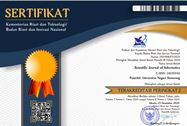Accuracy Measurements and Decision Making by Naïve Bayes and Forward Chaining Method to Identify the Malnutrition Causes and Symptoms
(1) University of Agriculture Faisalabad
Abstract
Malnutrition is characterized as muscle weakening and cognitive disparity caused by social, dietary, political, food security issues. It appears as many underlying symptoms like fatigue, weakness, micronutrient deficiencies, weight loss to apparent symptoms of muscle mass reduction. Every 1 in 5 children is malnourished in developing countries. Purpose: Policies and program formulation require prevalence facts to classify the most prevalent cause. Diagnostic tools and computer modeling have revolutionized the world of health sciences. Much algorithmic formulation can help to predict the prognosis of diseases based on the previous fact sheets. Methods/Study design/approach: Naïve Bayes provides the posterior probability value that gives an analysis of the member with the whole sample set. Forward chaining gives the logistic conclusion with IF and THEN approach. Result/Findings: Naïve Bayes provided high accuracy of 88% as compared to 85% forward chaining. Novelty/Originality/Value: In this study, the Naïve Bayes algorithm approach is coupled with the forward chaining system to provide a highly accurate measurement of the cause of malnutrition.
Keywords
Full Text:
PDFReferences
C. Hawkes, M. T. Ruel, L. Salm, B. Sinclair, & F. Branca, "Double-duty actions: seizing programme
and policy opportunities to address malnutrition in all its forms. The Lancet, 395(10218), pp. 142-155,
N. Dukhi, "Global prevalence of malnutrition: evidence from literature," In Malnutrition, 2020.
J. C. Wells, A. L. Sawaya, R. Wibaek, M. Mwangome, M. S. Poullas, C. S. Yajnik, & A. Demaio, "The
double burden of malnutrition: aetiological pathways and consequences for health," The Lancet,
(10217), 75-88, 2020.
K. R. Arlinghaus, C. Truong, C. A. Johnston, & D. C. Hernandez, "An intergenerational approach to
break the cycle of malnutrition," Curr. nutr. rep., 7(4), pp. 259-267, 2018.
A. S. Almasaudi, S. T. McSorley, R. D. Dolan, C. A. Edwards, & D. C. McMillan, "The relation
between Malnutrition Universal Screening Tool (MUST), computed tomography–derived body
composition, systemic inflammation, and clinical outcomes in patients undergoing surgery for
colorectal cancer," The Am. j. clin. nutr., 110(6), pp. 1327-1334, 2019.
F. Landi, M. Camprubi-Robles, D. Bear, T. Cederholm, V. Malafarina, A. Welch, & A. Cruz-Jentoft,
"Muscle loss: the new malnutrition challenge in clinical practice," Clin. Nutr., 38(5), 2113-2120, 2019.
B. M. Popkin, C. Corvalan, & L. M. Grummer-Strawn, "Dynamics of the double burden of malnutrition
and the changing nutrition reality,“ The Lancet, 395(10217), pp. 65-74, 2020.
R. N. Apriyono, A. Triayudi, & I. D. Solihati, "Web-based expert system detects malnutrition in
toddlers with the naïve bayes method," J. Mantik, 4(3), pp. 2178-2183, 2020.
T. E. Putri, R. T. Subagio, & P. Sobiki, "Classification system of toddler nutrition status using naïve
bayes classifier based on z-score value and anthropometry index," J. Phys.: Conf. Ser., 1641, 2020.
P. L. Kumalasari, R. Arifudin, & Alamsyah,"Decision making system to determine childbirth process
with naive bayes and forward chaining methods", Sci. J. Inform., 7(2), pp.180-188, 2020.
O. Arifin, K. Saputra, & H. Fathoni, "Implementation of data mining using naive bayes classifier
method in food crop prediction," Sci. J. Inform., 8(1), pp.43-50, 2021.
Y. F. Safitri, R. Arifudin, & M. A. Muslim, "K-nearest neighbor and naive bayes classifier algorithm
in determining the classification of healthy card indonesia giving to the poor," Sci. J. Inform., 5(1), pp.
, 2018.
UNICEF, WHO and the World Bank Group, "Levels and trends in child malnutrition," Accessed:
February 2021. [Online]. Available: https://www.unicef.org/reports/joint-child-malnutritionestimates-
levels-and-trends-child-malnutrition-2019.
Refbacks
- There are currently no refbacks.
Scientific Journal of Informatics (SJI)
p-ISSN 2407-7658 | e-ISSN 2460-0040
Published By Department of Computer Science Universitas Negeri Semarang
Website: https://journal.unnes.ac.id/nju/index.php/sji
Email: [email protected]
This work is licensed under a Creative Commons Attribution 4.0 International License.


